Celebrating the impact of innovative and transformational projects
Our Aspire, Achieve, Sustain: Impact Conference on 9 October 2024 provided an opportunity to explore and celebrate the impact of innovative and transformational projects.
This jam-packed day brought together representatives from government, NHS, the charity sector and MOD to consider the impact of aspirational grant making – looking at how to be brave, think strategically and spend well in a challenging funding climate.


Welcome and opening address
Anna Wright, Chief Executive of the Trust, set the scene, challenging delegates to “ask questions, tell us what you need to tell us, so that we can support you in the very best way that we can.”

We were delighted to welcome James Greenrod, Head of Armed Forces People Support at MOD, to give our opening address. He reflected on why the Covenant exists and acknowledged that delivering the Covenant isn’t something that Defence can do alone – they need to reach out to other Government departments, the charity sector, the whole nation, to deliver on the Covenant promise.
James told us: “I think it’s really important to remember that, again not least thanks to the efforts of a number of people in this room, the Covenant has been a success to date.”
James is confident that Covenant delivery will be further strengthened and improved. He continued: “We want to go as far as we possibly can to make sure that those who serve and have served are not disadvantaged, and that special consideration is given for those who have given the most.”
Sharing learning and good practice
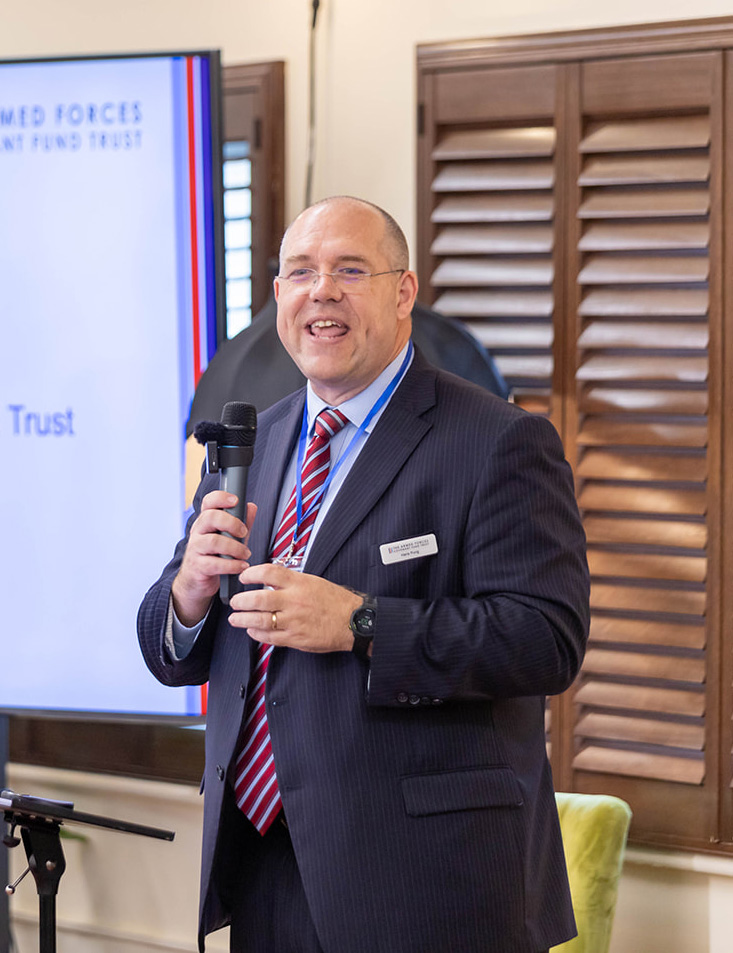
Hans Pung, Chair of the Trust and President of RAND Europe, reminded us that while £10.5 million is delivered through the Covenant Fund, last year the Trust actually gave out 311 grants worth over £30 million, because other government programmes looking to support the Armed Forces will use the Trust as a trusted vehicle to help deliver these objectives.
Hans also highlighted the Trust’s role in sharing learning and good practice across grant holders. He encouraged delegates to “tell your stories about what’s worked, inspire others to think about how you might look to do things differently to the benefit of your beneficiaries and the wider Armed Forces community.”
What thinking big can achieve
We were excited to welcome a plethora of distinguished speakers from within the Armed Forces community, to share their experiences of transformational grant making.
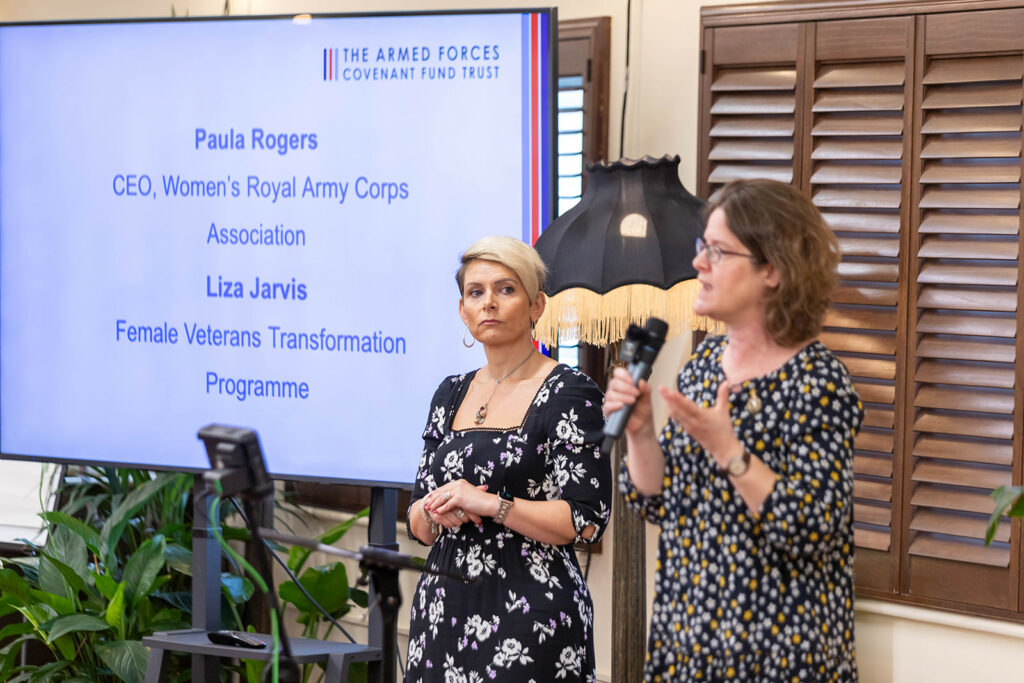
Paula Rogers (WRACA) and Liza Jarvis, Lead of the Female Transformation Programme, spoke about the impact of aspirational grant making. The Female Transformation programme, which received a Transformational Grant from the Trust, aims to deliver long-term systemic change for female Veterans by working collaboratively across the Armed Forces charity sector, developing good practice and reducing barriers for female Veterans accessing services.
Paula explained how the name ‘Female Transformation programme’ helped to focus their work: “Every time we think about the next step or what we’re going towards or everything that we do […] we think ‘is this transformational?’ Or ‘is this a step on the journey to transformational?’ Just the name of the grant has been hugely helpful in setting us on the right path.”
Liza expanded on this theme, telling us: “One of the big things that’s coming out of this piece of work is the recognition that women also serve, and actually making people aware [of] the fantastic contributions that they’ve made, sharing case studies and examples of where women have done great things.”
Liza acknowledged that one of the things that’s helped the project is being ambitious from day one: “It’s taken a lot of hard work, but actually what it’s taken more than anything is collaboration and partnership work. We could not have done this on our own.”
The importance of being brave
Lt Gen Richard Nugee, Chief Executive of the Scar Free Foundation, joined us to discuss bravery in grant making. Richard stressed how bravery from funders can encourage innovation, allowing projects to be more ambitious in their work. He inspired delegates by comparing this to climbing a mountain: “We know what the top looks like, and we know we need to get to the top. We have no idea how to get there. So, we’ll go up paths which lead to dead ends, we’ll go up paths that lead to the perfect ledge, but you can’t get any further. We’ll go up paths that lead to other paths we didn’t even know […] with someone else climbing up the other side of the mountain and we link up. That’s what bravery in research is. It’s knowing what you need to do, but not knowing the way.”
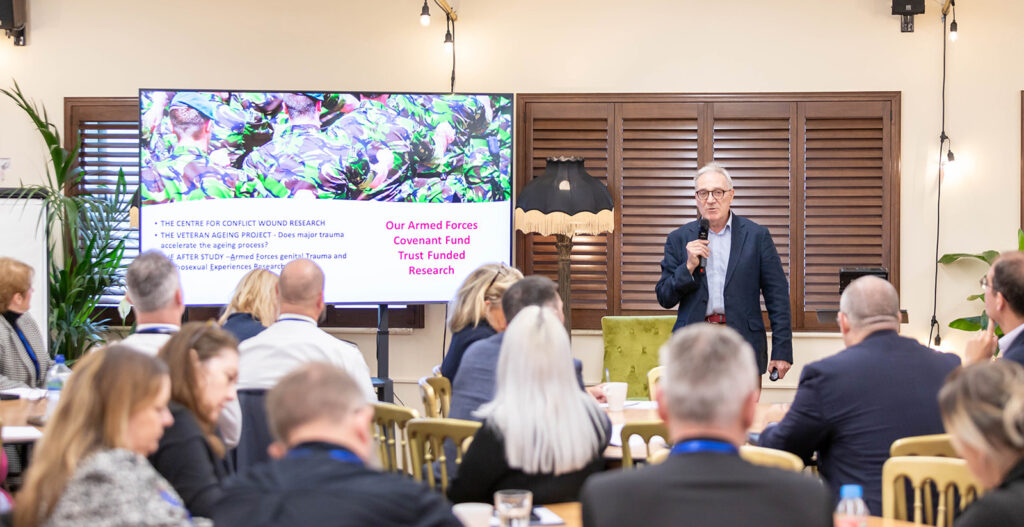
The Scar Free Foundation’s work with the CASEVAC Club of wounded Veterans to understand and alleviate the impact of conflict-related genital scarring and loss-of-function, received funding through the Trust’s Transformational Grants programme.
Thinking strategically in a challenging funding climate
Sustainability was another key thread throughout the day. Lisa Farmer, CEO at RBLI, spoke about the importance of creating a lasting legacy. The RBLI supports Veterans in being independent and leading a full life after Service through social enterprise, their Lifeworks course and within their Veterans Village in Kent, a £28 million investment providing homes for Veterans.
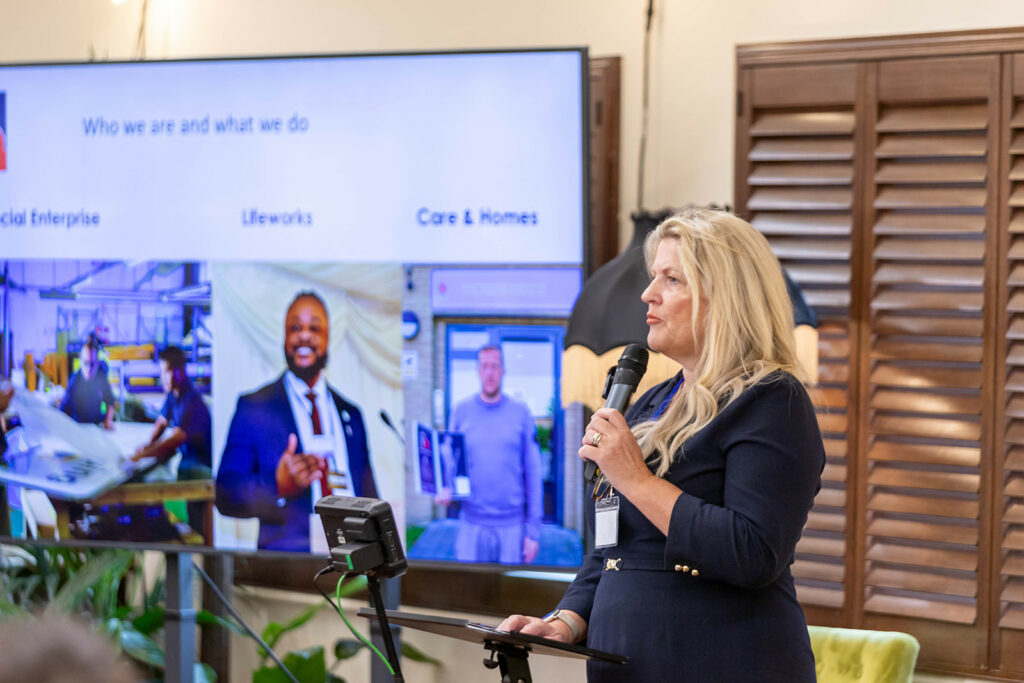
Lisa explained: “This isn’t about just doing the project or doing good work or a quick fix. This is about creating learning, information and data that the whole community can use, that we can put into developing services, that we can share good practice, and that we can really begin to get under the skin of the problems and make real change”. Echoing earlier speakers, Lisa emphasised that collaboration and partnership is vital.
The work RBLI are doing is long term and will help to shape lasting services. Lisa continues: “More now than ever, funders are wanting us to find not short-term fix, but long term interventions and solutions.”
Spending well
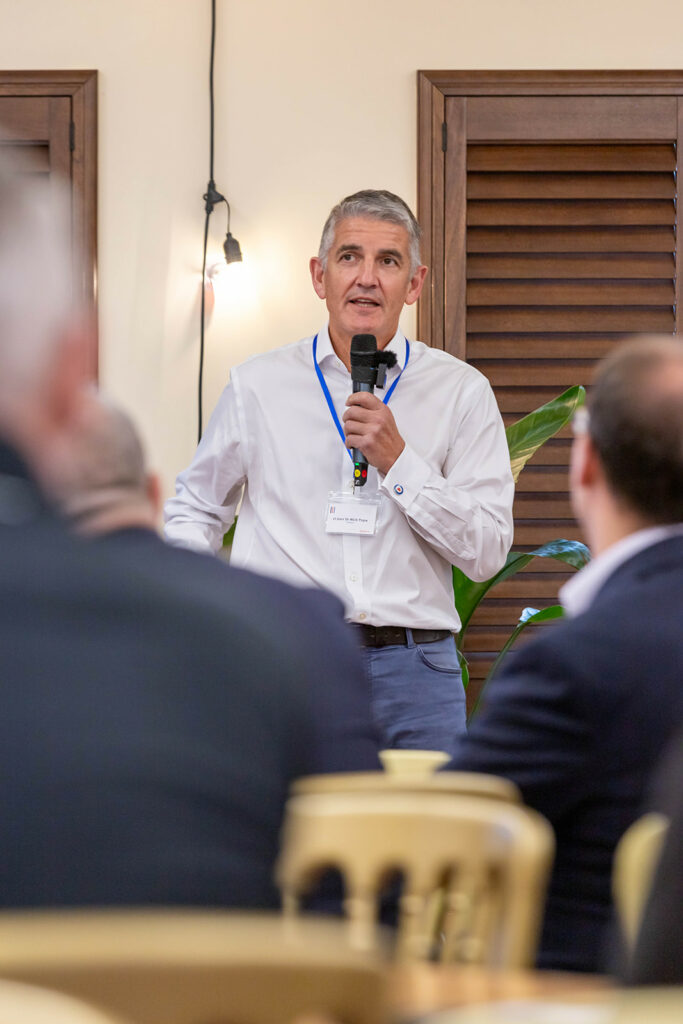
Finally, we concluded our morning group of speakers with Lt General Sir Nick Pope, COBSEO Chair and AFCFT Trustee. Sir Nick provided an insight into the Trust’s grant making and the importance of spending well. He explained: “The idea behind the Covenant Fund Trust is to seek those areas where there is a gap in the market, either to glue together things that are broken […] or to pick up areas where people are not really doing what the Armed Forces Covenant was designed to do.
“What the Trust is doing is trying to add value to this sector, but also in some areas to go further.”
Sir Nick highlighted the Veterans’ Places, Pathways and People (VPPP) programme, and the way in which it focused on collaboration at a local level. The newly launched Thrive Together programme will build on this, exploiting best practice at a local level. Finally, Sir Nick also addressed sustainability and explained how he hoped the Trust’s new three-year funding framework will provide a better mechanism to think about this.
Thoughts on sustainability
Carrying on the theme of sustainability, we were pleased to welcome Mandy Harding, Head of Commissioning Grants, RNRMC, to our afternoon session. Mandy provided us with some food for thought, considering the key themes of vision, culture and expectations.
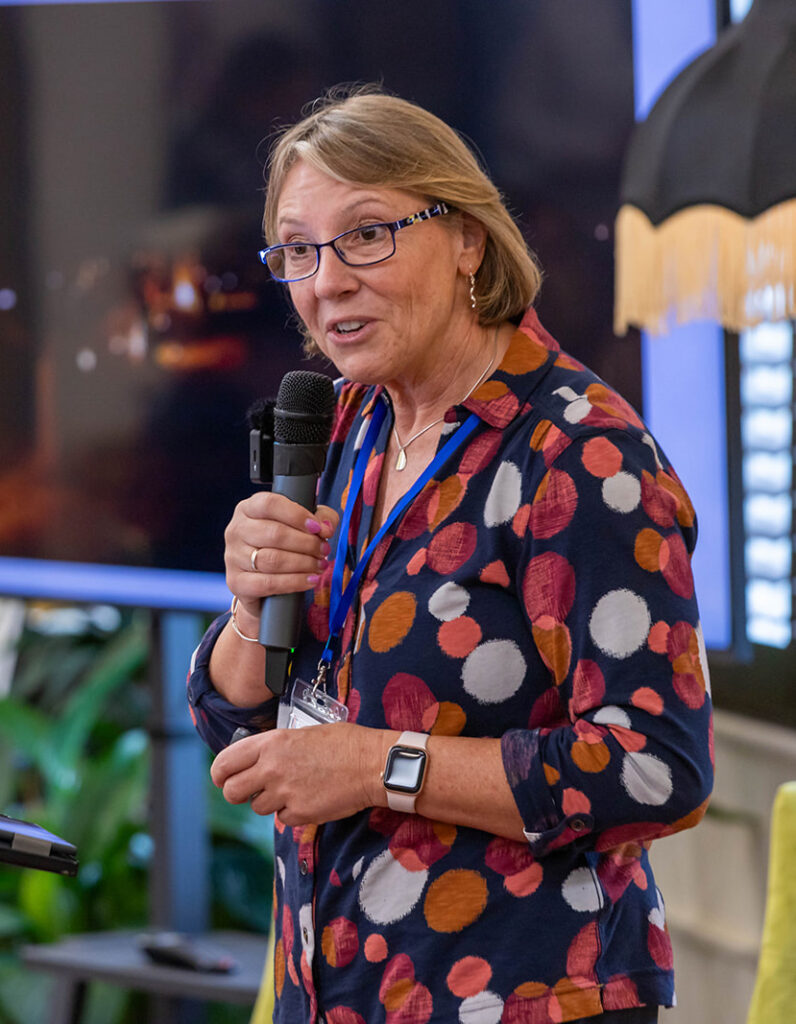
She told delegates: “Transformational work takes courage in holding to a vision, not being afraid to go back and check it out, being prepared to change direction to respond to changing needs, being prepared to take detours as you learn and see new things.”
To create and change culture you need to become a person of influence. Mandy encourages us to “live it, promote it, demonstrate it, nurture, encourage and show up. Others will follow.” Being agile and responsive is key.
She also spoke about how important working together is, and how in order to work well we need to clarify expectations: “We should be clear on expectations and outcomes so we are all pulling in the same direction on the same page so that a real difference can be made for our beneficiaries. They are the people that truly matter and why we are all here.”
Putting your questions to the panel

Attendees had the opportunity to put their questions to speakers during two lively panel discussions. Questions were wide ranging, from how we can address stigmas associated with scarring, to what’s being done for ethnic minority female Veterans, what barriers and challenges exist when helping those at the lowest ebb, to how we make sure research data provides an accurate picture for the whole of the UK, and whether there is there a misunderstanding or misrepresentation of services like Op Courage.
You can watch the full panel discussions as part of our livestream recording below.
Continuing the discussion through interactive workshops
This year, we offered delegates the chance to take part in two interactive workshops; the first run by NVCO and focusing on Theory of Change, the second focused on sustainability and how to create long term impact.

Online attendees were treated to an online session delivered by DSC focusing on the characteristics of well performing organisations.
These opportunities for further learning and discussion added an additional element to the day’s proceedings; especially for those in the room who were able to make new connections and hopefully benefit from shared experiences.
The impact of support in hospital settings
Finally, our conference featured a pre-launch of the final evaluation report for the Supporting Armed Forces in Acute Hospital Settings programme.
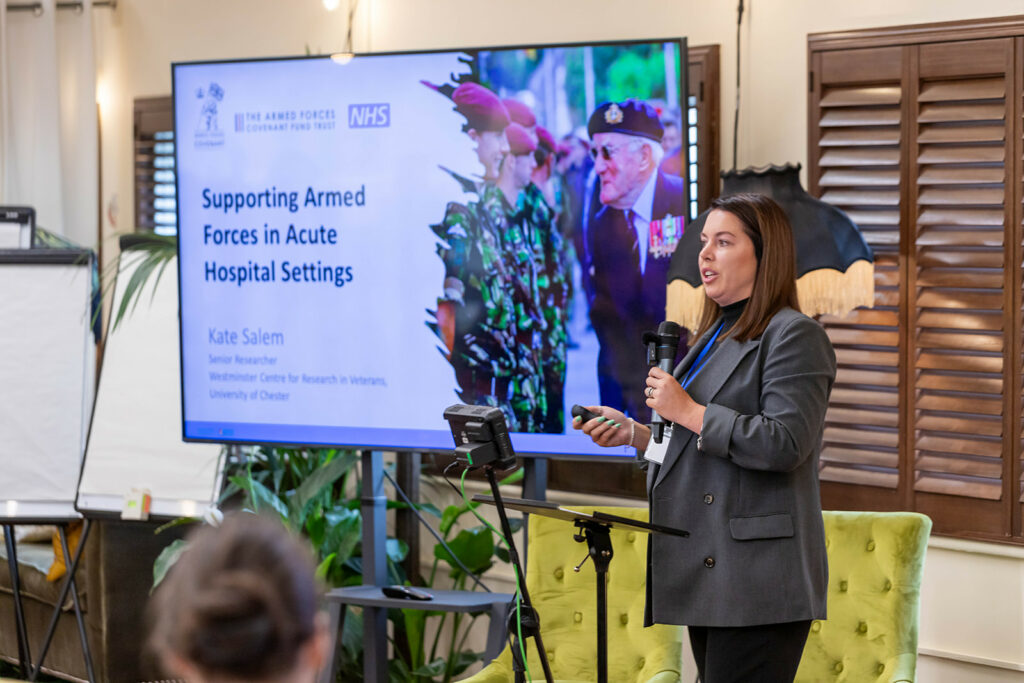
Funded in partnership with NHS England, the Supporting Armed Forces in Acute Hospital Settings programme established the role of Armed Forces Advocates (AFAs) in hospitals to provide Veterans and their families with additional care and support when it was most needed. The Evaluation Report, produced by the University of Chester, was shared with delegates by Kate Salem from the University, who gave and overview of the evaluation’s key findings and recommendations. You can read the full report here.
Speaking about his role as AFA at James Paget University Hospitals NHS Foundations Trust, Chris Blyth explained his work was based on what could be achieved within ‘business as usual’ to ensure the sustainability of the role.
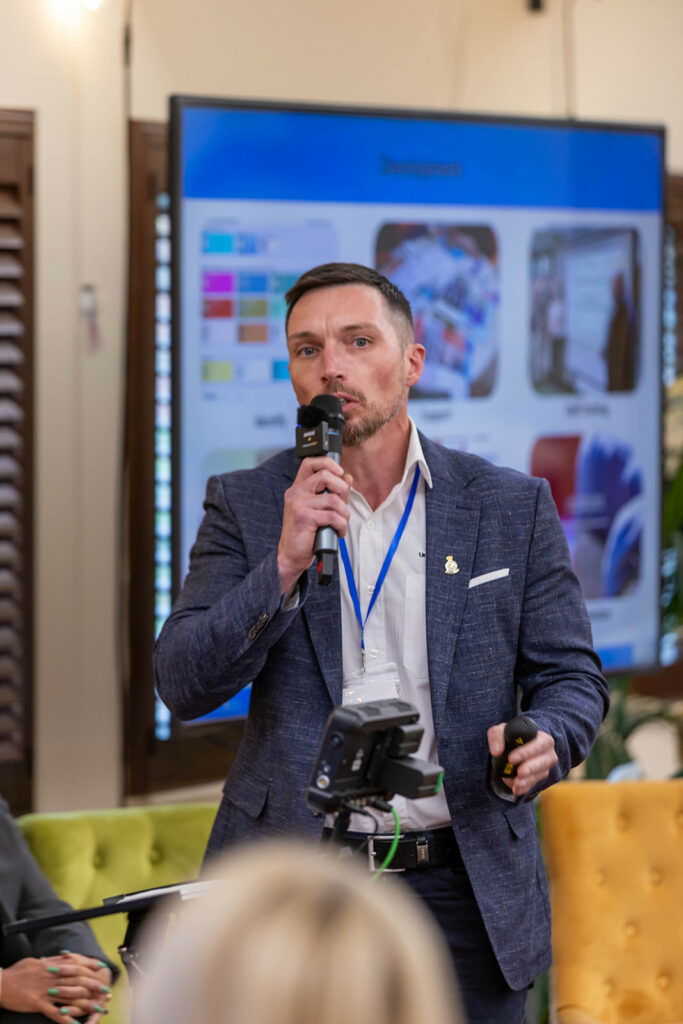
Central to Chris’ approach was to make sure the work he was doing was visible to staff, sharing good news stories and awareness of the support provided: “Get people to trust in what you’re doing and then you have a function in that organisation that becomes business as usual and becomes day to day practice.”
Chris was also able to extend the service out into the community with the aim of reaching Veterans needing support before they get into hospital. He explains “What about if we can actually get to the Veteran that needs support before they come into the hospital? Then we’re maybe saving someone a trip into hospital, which saves the NHS money, but also we’re getting support to that person quicker”. This helped them align with the NHS Trust’s future planning strategy, further cementing the value of the AFA role.
Look out for further details of our wider launch of this important evaluation, coming soon.
Find out more
We’d like to thank everyone who made our conference such a thought-provoking and inspiring day.
Resources from the conference are available in our Knowledge Network including speakers’ slides (when available) and the livestream recording.
More details of the Acute Hospitals programme are available here, and you can find out more about the projects awarded through our Transformational Grants Programme here.